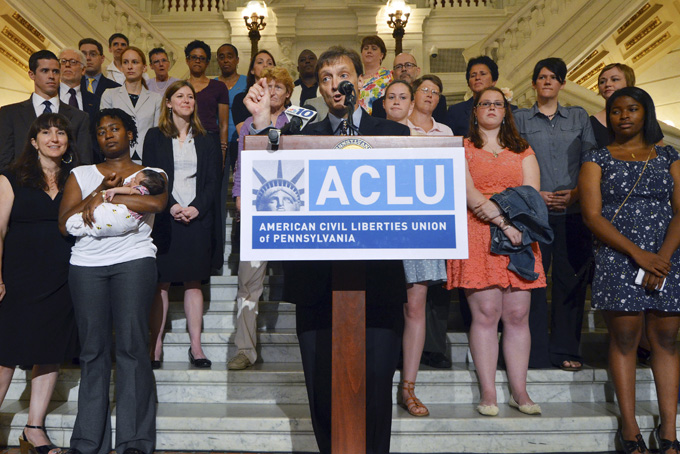
American Civil Liberties Union lawyer Witold J. Walczak speaks alongside many of the 23 men, women and children who are plaintiffs in a lawsuit seeking to overturn a state law effectively banning same-sex marriage in Pennsylvania, during a Capitol news conference, Tuesday, July 9, in Harrisburg, Pa. (AP Photo/Marc Levy)
by Marc Levy
Associated Press
HARRISBURG, Pa. (AP) — Civil rights lawyers filed the first known legal challenge Tuesday on behalf of 23 men, women and children seeking to overturn a 17-year-old state law effectively banning same-sex marriage in Pennsylvania, the only northeastern state that doesn’t allow it or civil unions.
The lawsuit, filed in federal court in Harrisburg, also asks a federal judge to prevent state officials from stopping gay couples from getting married. It names Gov. Tom Corbett, Attorney General Kathleen Kane and three other officials.
The plaintiffs are a widow, 10 couples and one of the couples’ two teenage daughters. They include four couples who were legally married in other states but whose marriages go unrecognized by Pennsylvania.
Same-sex marriage is legal, or soon will be, in 13 states. The lawsuit seeks to legalize it in Pennsylvania and to force the state to recognize the marriages of same-sex couples who wed in other jurisdictions.
Lawyers in the case believe it is ultimately bound for the U.S. Supreme Court, probably along with similar cases that are cropping up in other states, and could force the high court to rule on the core question of whether it is unconstitutional to deny same-sex couples the right to marry.
The plaintiffs, some of whom spoke during a news conference in the state Capitol after the lawsuit was filed, said their willingness to join was driven partly by a desire to have the legal and financial protections afforded to opposite-sex couples, but mostly by the emotional satisfaction of seeking social justice.
“Everyone in our world recognizes us as a true family,” said Deb Whitewood, 45, who lives in the Pittsburgh suburb of Bridgeville with her partner of 22 years, Susan Whitewood, and their three children. “We feel that it’s time that the commonwealth of Pennsylvania did, too.”
Another couple, Dara Raspberry and Helena Miller, who were cradling Miller’s 6-week-old daughter, said they married in Connecticut before moving to Philadelphia to be closer to family. But, Raspberry said, they were forced “to become unmarried and less of a family” under Pennsylvania law.
Isabel Rieser, the 21-year-old adopted daughter of plaintiffs Len Rieser and Fernando Chang-Muy of Philadelphia, said her two fathers should be able to marry after 32 years of commitment.
“Besides, I am so over being a child out of wedlock,” Rieser joked. “I look forward to my parents finally getting married. I have so many ideas for their wedding: food, location, decorations.”
The plaintiffs are represented by the American Civil Liberties Union and the Philadelphia law firm of Hangley, Aronchick, Segal, Pudlin and Schiller.
Spokesman for Corbett and Kane would only say that their offices are reviewing the lawsuit.
In the lawsuit, the plaintiffs said banning gay marriage satisfies no legitimate government or child welfare concerns, since Pennsylvania judges routinely grant adoptions to same-sex couples that are viewed as in the best interest of the child.
“It serves only to disparage and injure lesbian and gay couples and their families,” the lawsuit said.
For instance, the suit says, same-sex couples do not have access to a long list of legal and financial protections.
Those include an inheritance tax exemption for widows; an automatic power of attorney for spouses in health care decisions; damages and legal recourse under workers’ compensation laws for a spouse; assistance programs for same-sex widows and widowers of military personnel and veterans; pension and survivor benefits for widows and widowers of public employees; Family Medical Leave Act provisions; and a spouse’s Social Security retirement benefits.
The lawsuit, in the works since January, was not spurred by the U.S. Supreme Court’s 3-week-old decision that the federal government must grant federal benefits to same-sex couples who were married and live in states that allow same-sex marriage.
But the ACLU’s legal director in Pennsylvania, Witold J. Walczak, said the nation’s changing laws and evolving public opinion made it the right time to challenge the law after 17 years on Pennsylvania’s books.
Federal courts in California are so far the only ones that have said a state same-sex marriage ban violates the U.S. Constitution. Meanwhile, federal court challenges are emerging in other states, including Nevada, Hawaii and Michigan. In the coming days and weeks, the ACLU plans to lodge same-sex marriage challenges in North Carolina and Virginia.
It is also pursuing same-sex marriage legislation in several other states and referenda in Oregon and Nevada in the coming years, ACLU lawyers said.
Every state except Pennsylvania in the northeastern United States allows same-sex marriage except New Jersey, which allows civil unions.
A 1996 Pennsylvania law defines marriage as a civil contract in which a man and a woman take each other as husband and wife, and it says same-sex marriages, even if entered legally elsewhere, are void in Pennsylvania. State law does not allow civil unions.
Recent polls show a majority are in favor of gay marriage in Pennsylvania, even though bills to legalize gay marriage have gone nowhere in recent years in the Legislature. In 2012, the state voted for President Barack Obama, a Democrat who supports same-sex marriage, and in 2010 for Corbett, a Republican who supports a constitutional amendment to permanently ban it.
The 1996 law passed with overwhelming majorities in the state Legislature. During the debate, the lawmaker who wrote the amendment, Republican House Rep. Allan Egolf, said: “This amendment does not take anything away from anyone that they now have. It is simply an expression of Pennsylvania’s traditional and longstanding policy of moral opposition to same-sex marriages.”